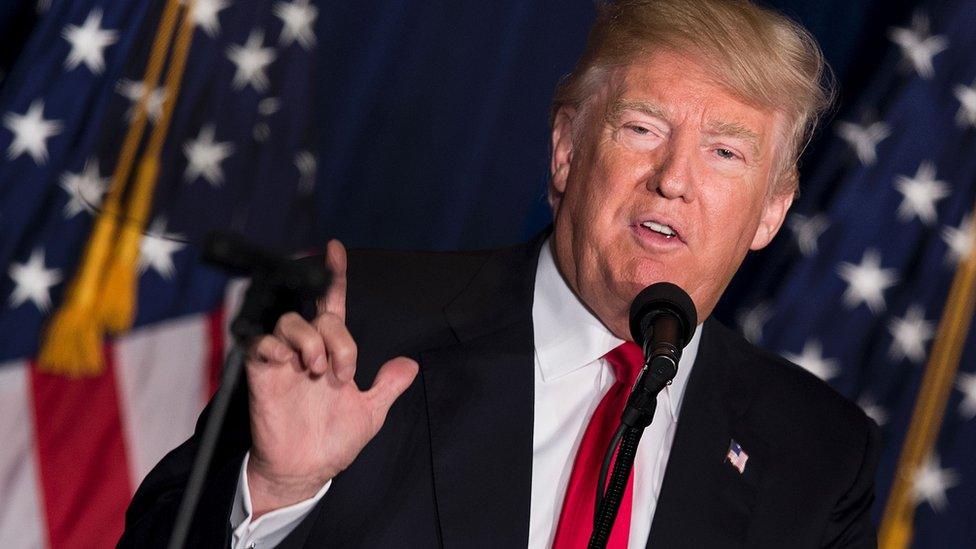Donald Trump's top four 'deals' for foreign policy
- Published

Nearly 30 years ago Mr Trump topped the best-seller list with his salesman's manifesto, The Art of the Deal. On Wednesday the Republican front-runner's foreign policy vision was all about how he can get the best deal for the US - on trade, relations with major powers, mid-east peace - everything.
Since the end of the Cold War, the US has been weak, he said. Now it will be strong. The US has been taken advantage of by its allies, he contended, but he will make them pay their fair share - while assuring them that they can trust the US.
How? Through his deal-making prowess and policy "coherence".
Although Donald Trump's much-heralded speech was scripted and delivered via Tele-prompter, content-wise it was essentially a calmly intoned reprise of the views he has expressed throughout the campaign.
While that may not fly with a foreign policy establishment that has teetered on the verge of panic over some of Mr Trump's more controversial proposals, this "America first" rhetoric has been at the heart of the message that has shot Mr Trump to the top of the Republican heap.

The Middle East: Israel and Iran
Trump: Obama 'not been a friend to Israel'
When it came to the Middle East, Mr Trump was correct on some points, contradictory on others, and completely wrong in some cases. It's true that President Barack Obama's policy there has angered Washington's allies in the region. But in some ways, that's because President Obama argued, like Mr Trump, for an "America First" approach to avoid getting entangled in another costly war far from home.
But Mr Trump's emphasis of "a line in the sand" he would enforce struck at President Obama's failure to act on the "red line" he drew in Syria.
Mr Trump also spoke passionately about fighting Islamic State as if this would amount to a change in policy - it's one of President Obama's major priorities.
And his point that it was largely a philosophical battle was repeated time and again by President Obama's former envoy General John Allen who called it a "battle of ideas."
As for "mistakes" in Iraq, that goes all the way back to the Bush administration. When it comes to Iran, it's not clear why he declared a few times - to loud cheers -that "Iran cannot be allowed" to get a nuclear weapon.
That's exactly why President Obama, and other major powers, reached the deal Mr Trump so loudly criticises.
And Islamic State making millions every week selling Libya's oil? That's simply not true.
- Lyse Doucet, Chief International Correspondent

Russia and China
Trump says US and China can 'both benefit or we can both go our separate ways'
When the topic turned to relations with world powers Russia and China, Donald Trump put aside rattling sabres and opted for acknowledging what he said were serious differences with "open eyes".
As Russian ambassador to the US Sergie Kislyak watched from the front row, however, Mr Trump added that "we are not bound to be adversaries".
For Mr Trump it all comes down to success through strength. Relations with Russia will be improved "from a position of strength". Strength, he said, is what China respects.
Again he used the language of a businessman seeking to land a winning deal with a savvy counterpart. The negotiations will be in good faith, but if bargaining goes bad the US is prepared to withdraw.
What do Russians think of Donald Trump?
Hillary Clinton called for a "reset" for US relations with Russia and was roundly mocked for perceived naiveté. On Wednesday Mr Trump didn't use the "r" word, but the message was similar.
"Some say the Russians won't be reasonable," he said. "I intend to find out."
- Anthony Zurcher, BBC North America reporter

International trade
Trump: 'Consequences for companies that leave the US'
International trade came up several times in Mr Trump's speech. China's membership of the World Trade Organisation has been a "total disaster for the United States". So has Nafta, a free trade agreement with Canada and Mexico, which Trump believes "has emptied our states of our manufacturing and our jobs".
He warned of consequences for companies that leave the United States, only to exploit it later. This is about "offshoring", companies moving jobs abroad to places where pay is lower and then selling the goods to Americans.
He has said he would impose tariffs on such goods when they are imported into the US, but he didn't spell out the consequences of doing so in this speech.
There was no sign here of any softening of Mr Trump's hostility to the kind of trade liberalisation agreement that the US has been pursuing under presidents of both parties.
- Andrew Walker, BBC World Service economics correspondent

Allies - Nato and otherwise
Trump wants a meeting with Nato allies if elected
Donald Trump said on Wednesday that America's allies are not paying their fair share, questioning both Nato and US military support for its allies in Asia.
These are cornerstones of US policy since World War Two, nonetheless Trump says the countries in question must pay for the cost or defend themselves.
In some ways, Trump isn't a million miles from the Obama administration. Britain has been chided by the US for not spending the Nato minimum of 2% of GDP on defence, and has now stepped up.
President Obama has publicly complained of "free riders" expecting the US to defend them. But the Obama administration has pivoted towards the Pacific powers, and sees support of Japan and South Korea as an important hedge against China's influence.
Trump prefers to curb China's economic influence through trade deals rather than spend money he says America can't afford on defending allies abroad.
- Laura Trevelyan, BBC World News America